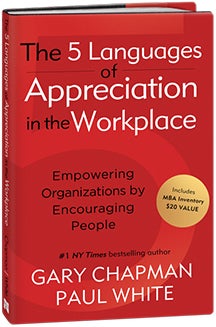July 7, 2014
Guest Post By Paul White, Ph.D.


And research confirms that there are serious problems in the workplace today:
*While over 80% of large corporations have employee recognition programs, only 31% of their employees say they feel valued for doing good quality work.
*Only 8% of employees feel their top management cares about them personally.
*70% of employees are either totally disengaged or under engaged in their work.
*Yet only 21% of these workers are looking for work elsewhere, meaning approximately 50 % of the workforce are just passively enduring work they don’t enjoy.
The workplace environment can change for the better. Unfortunately, many recognition efforts by managers are misguided and wind up being a waste of time and effort. Why? Because they are not built upon the core principles we know are needed for appreciation to be communicated effectively.
Core Principles for Effectively Communicated Appreciation
*Make sure your praise is specific and personal. The most common mistake organizations and supervisors make is that their communication is general and impersonal. They send blast emails: “Good job. Way to go team.” But they have no specific meaning to the individual who stayed late to get the project completed. Use your colleague’s name and tell specifically what they do that makes your job easier.
*Realize that other types of actions can be more impactful than words for many people. Some people (seemingly, often men) do not value verbal praise (the “words are cheap” mentality). For many people, they have grown to not believe compliments from others, expecting them primarily to be an act of manipulation. Other actions can be more impactful for these individuals, like spending time with them or helping them get a task done.
*Use the language of appreciation valued by the recipient. Not everyone likes public recognition or social events. One leader told me, “You can give me an award but you’ll have to shoot me first before I’ll go up and get it in front of a crowd.” And for many introverts, going to a “staff appreciation dinner” is more like torture than a reward for doing a good job. They may prefer getting a gift card for a bookstore and staying at home and reading. Find out what they value and communicate in that language.
*Separate affirmation from constructive criticism or instruction. If you want the positive message to be heard “loud and clear”, don’t follow your affirmation with a “Now, if you would only…” message. Don’t give them a compliment and then tell them how they could do the task better. They will only remember the critique and instruction, and may not even hear the positive.
*Absolutely be genuine. Don’t try to fake it, or overstate your appreciation (“You are the best administrative assistant in the free world!”). People want appreciation to be genuine, not contrived.
I have been privileged to help improve workplace environments and teach teams how to communicate authentic appreciation in public schools, medical facilities, manufacturing firms, universities, restaurants, government agencies and financial firms. Listen in to the webinar and interview on Thursday, July 17 – and learn practical steps to encourage your staff that you can implement immediately.
* * * * *


Register for an exclusive webinar with Dr. Paul White hosted by Terryberry on Thursday July 17 to learn strategies for effectively communicating appreciation and encouragement to your employees.
Categories
Tags
PermalinkComments (1)
Leave a Comment
You must be logged in to post a comment.


Sometimes you have to save the “…but next time…” for another day! Let the compliment stand on it’s own two feet for a little while. If every compliment comes with a “but” the compliment loses any value. It may soften the blow of the criticism, but you can’t forget that people like to be appreciated!